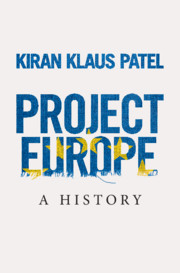Book contents
- Project Europe
- Project Europe
- Copyright page
- Contents
- Figures, Maps and Tables
- Abbreviations
- Frontispiece
- Prologue
- 1 Europe and European Integration
- 2 Peace and Security
- 3 Growth and Prosperity
- 4 Participation and Technocracy
- 5 Values and Norms
- 6 Superstate or Tool of Nations?
- 7 Disintegration and Dysfunctionality
- 8 The Community and Its World
- Epilogue
- Acknowledgements
- Notes
- Bibliography
- Index
3 - Growth and Prosperity
Published online by Cambridge University Press: 24 April 2020
- Project Europe
- Project Europe
- Copyright page
- Contents
- Figures, Maps and Tables
- Abbreviations
- Frontispiece
- Prologue
- 1 Europe and European Integration
- 2 Peace and Security
- 3 Growth and Prosperity
- 4 Participation and Technocracy
- 5 Values and Norms
- 6 Superstate or Tool of Nations?
- 7 Disintegration and Dysfunctionality
- 8 The Community and Its World
- Epilogue
- Acknowledgements
- Notes
- Bibliography
- Index
Summary
What was the contribution of European integration to the economic history of Western Europe? Also on this issue, the EU often claims to have been both important and successful while, in fact, there is surprisingly little research on its economic effects. This chapter argues that the EC did indeed contribute to growing material prosperity in the member states during the Cold War. However, this contribution remained rather modest, at well below half of 1 per cent additional GDP growth per annum. The European Community had greater weight in relative terms during the 1970s and 1980s than during the 1950s and 1960s, even this has been generally overlooked to date. It thus played a greater role once the post-war boom was over, and, without it, the slump would have been even worse. Those aspects aside, the location of the economic within the integration process remained curiously vague during the Cold War. Economic integration was on the one hand an end in itself to promote prosperity; on the other it was always just a means to achieve overarching political objectives.
- Type
- Chapter
- Information
- Project EuropeA History, pp. 84 - 115Publisher: Cambridge University PressPrint publication year: 2020



